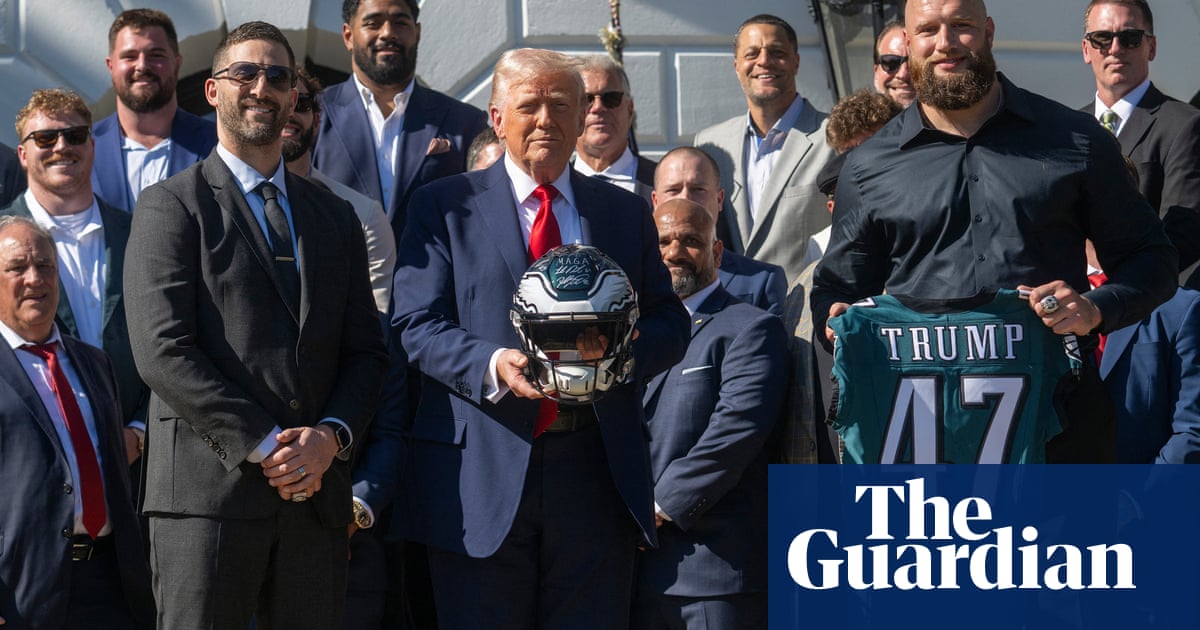Donald Trump feted the Super Bowl championPhiladelphia Eaglesat the White House on Monday, but several players, including quarterback Jalen Hurts, decided to skip the celebration.
Hurts and other players cited scheduling conflicts as the reasons for their absences, according to a White House official who spoke on condition of anonymity.
Despite the quarterback’s absence, Trump called Hurts a “terrific guy and terrific player” who turned in “one stellar performance after another”during the Eagles’ run to the championship.
“The Eagles have turned out to be an incredible team, an incredible group,” Trump said.
In April, Eagles owner Jeffrey Lurie said attending the White House was not compulsory for players.“Our culture is that these are optional things,”Lurie said. “If you want to enjoy this, come along and we’ll have a great time and if you don’t, it is totally an optional thing.”
NBC Sports Philadelphia reported that other Eagles playerswho did not attend Monday’s ceremonyincluded AJ Brown, DeVonta Smith, Jalen Carter, Jordan Davis and Brandon Graham.
The Eagleswere disinvited to the White House in 2018, the last time they won the Super Bowl, after a number of players said they would drop out amid tensions over the anthem protests that had swept the NFL. Trump, then in his first term as president, had attacked players who knelt during the anthem to protest against racial inequality. At the time, Trump wrote on social media that the Eagles were in dispute “with their President because he insists that they proudly stand for the National Anthem, hand on heart, in honor of the great men and women of our military and the people of our country.”
Asked by a reporter on the red carpet of the Time magazine gala last week whether he would take part in the White House visit, Hurtsresponded with an awkward “um”and long silence before walking away.
The Eagles’ star running back, Saquon Barkley, visited Trump over the weekend at Trump National Golf Club in New Jersey, and caught a ride with the president to Washington on Air Force One.
“He loved it,” Trump said of Barkley’s flight on the presidential airplane. “He’s a great young guy and an incredible football player. Saquon had a season for the ages, running behind the most powerful offensive line in theNFL,” Trump said.
Barkley, meanwhile, pushed back on social media criticism earlier Monday for spending time with Trump. He noted that he has golfed with Barack Obama too.
“Maybe I just respect the office, not a hard concept to understand,” Barkley posted on X.
While Trump’s first term in office led to a number of athletes, such as LeBron James and Megan Rapinoe, criticizing the president,there has been little pushbackfrom the sports world so far in his second term. In February, Trump became the first sitting US president to attend the Super Bowl, andhis presence was welcomed by several players, including the Kansas City Chiefs’ Patrick Mahomes and Travis Kelce.
Teams who have won a major championship are traditionally invited to the White House to celebrate their victory with the president. However, during Trump’s first-term several teams were not invited or made it clear they would not attend if they were. Those teams included theNBA’s Golden State Warriors, and the United States Women’s National Teamafter their victoryat the 2019 Women’s World Cup.
